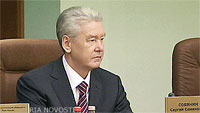Two thirds of Moscow residents happy with Sobyanin’s work – poll

(Interfax – MOSCOW, July 30, 2013) The share of Moscow residents happy with the work of the Moscow mayor, its government and Moscow City Duma grew, however the majority still think that authorities ignore wishes of Moscow residents when making decisions, sociologists said.
The share of Moscow residents happy with the work of acting Moscow Mayor Sergei Sobyanin grew from 51% in February to 64% in July, of the Moscow government – from 29% to 42% and of the Moscow City Duma – from 16% to 24%, the Public Opinion Foundation (FOM) said on Thursday citing a poll it conducted recently.
A third of Moscow residents are not happy with the government and the Moscow City Duma – 32% and 34%, respectively. The figures remained unchanged since February.
Currently, only 35% respondents (24% in February) said that the authorities took into account the wishes of Moscow residents when making a decision, while 50% (64% in February) said they were ignored.
When asked whether Moscow needed a new mayor, 20% said yes, 62% said Sobyanin should stay in office and 17% failed to answer.
When assessing the work of administrative district heads, 31% said it was good, 21% – bad and 35% said they knew nothing about this work.
The United Russia party took leading position at hypothetical elections to the Moscow City Duma – 30% respondents said they would vote for it. Nine percent said they would support the Russian Communist Party, 8% – the Russian Liberal Democratic Party, 3% each – the Civil Platform (Mikhail Prokhorov) and Yabloko (Sergei Mitrokhin), 2% – the People’s Alliance (Alexei Navalny). None of the respondents said they supported other parties.
A total of 18% said they would not go to elections at all, 2% would ruin ballots and 20% said they had not yet decided what their participation would be like in the elections.
The representative survey of Moscow residents involved 1,500 respondents aged over 18 on July 12-23. Face-to-face interviews were held at respondents’ places of residence.
